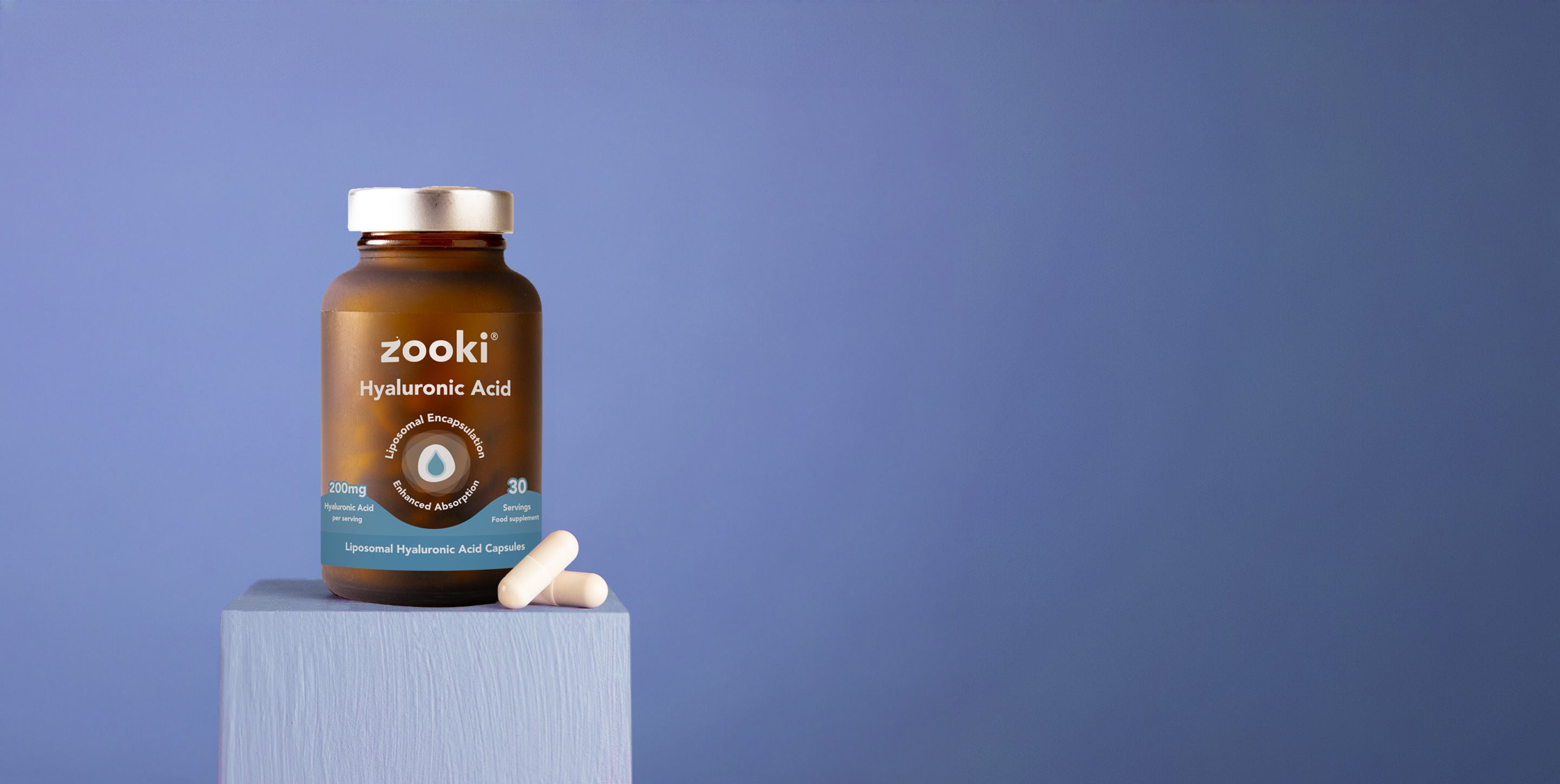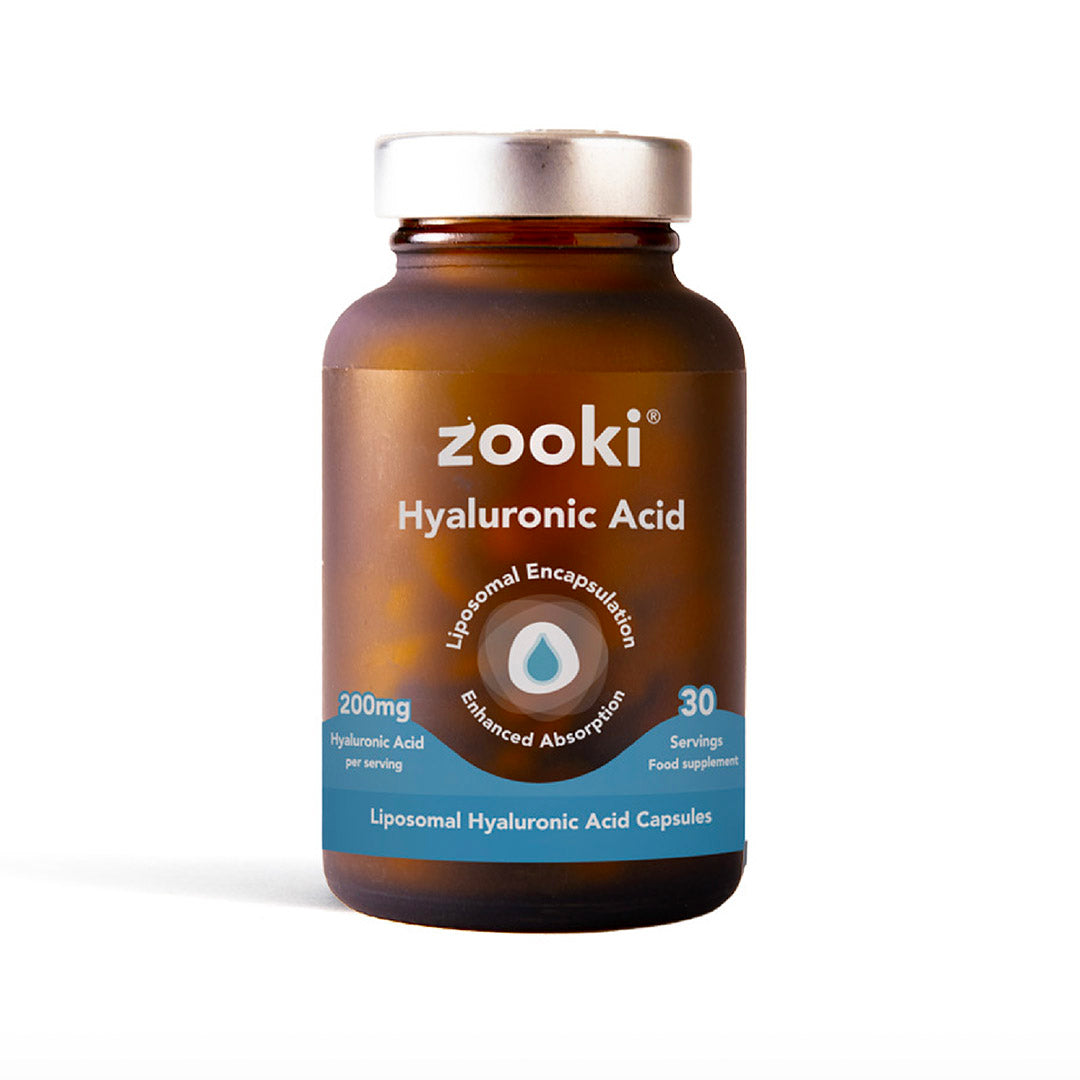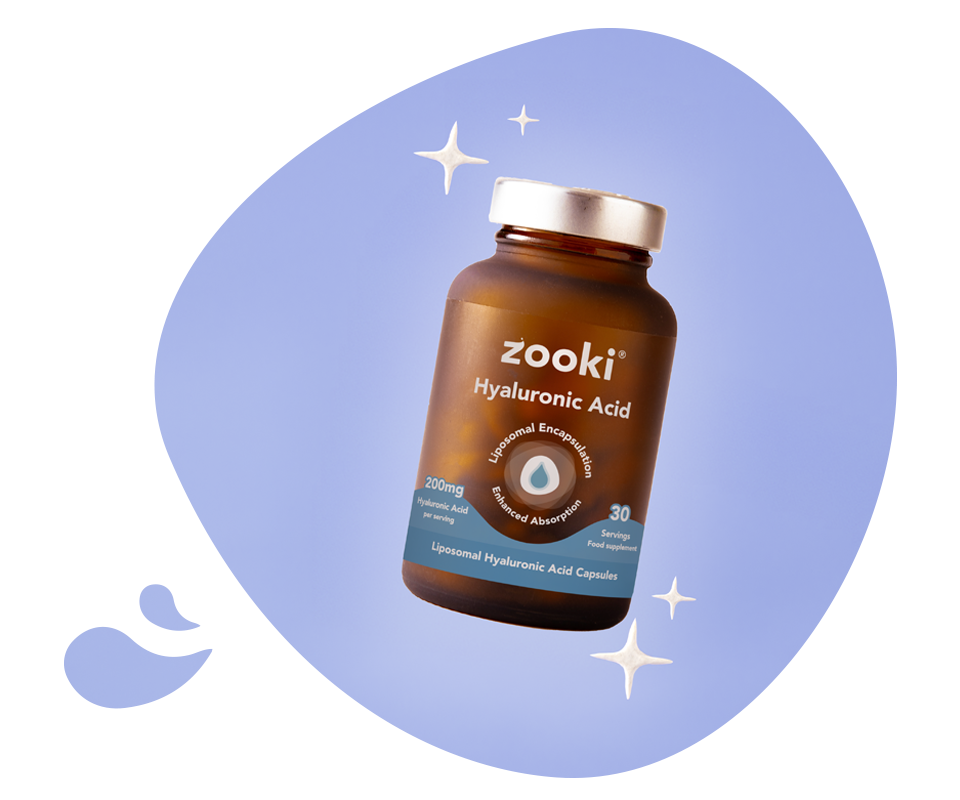
The moisture magnet
No moisturiser yet invented by humans comes close to the extraordinary properties of Hyaluronic acid. Because it can regulate how much water it takes in, it can morph from being a strong, protective cushion between the joints to stop them rubbing against each other, to a gooey, flexible, water bed-like layer under the skin to ensure flexibility and elasticity, and finally to a freely flowing liquid in the eyes that prevents them from drying out.
How does Hyaluronic Acid work?
Attracting water
- Hyaluronic acid is a glycosaminoglycan - a long chain-like molecule made up of disaccharides, which are simple sugars. Imagine a long bicycle chain but with loads of little hooks that reach out and grab onto passing water molecules.
Transporting moisture
- This ability to hold onto other molecules means that hyaluronic acid can also transport molecules throughout the body. It can also attach itself to body cells and act like a scaffold, allowing body tissues to grow around it.
Modulating immunity
- Finally, it modulates the immune system, helping offset aggressive chronic inflammation. Hyaluronic acid affects the immune system through upregulating anti-inflammatory cytokines called interleukin-110 and down-regulating chemokine production.

Hyaluronic Acid for skin
Using hyaluronic acid supplements consistently has been shown to improve overall skin health. That includes skin flexibility, skin elasticity and of course, skin hydration.
From the age of about 20, our body‘s natural daily production of Hyaluronic acid starts to decrease. This means that skin starts to lose its volume, plumpness and elasticity, resulting in the all-too-familiar fine lines, wrinkles, sagging and dehydration that bother us as we age. Hyaluronic acid sits in the extra-ceullular matrix between the cells, providing a highly organised structural framework and also exerting major effects on cell function. 50% of the total HA in the body is contained in the skin.

Hyaluronic Acid for joint health
Hyaluronic acid is a major component of synovial fluid around the joints, helping to cushion the joints, absorb shocks and reduce friction between cartilage and bones. High molecular weight hyaluronic acid has been shown to boost tendon repair and reduce inflammation in vitro. In another study, supplementing with hyaluronic acid for 3 months slowed down the progression of osteoarthritis in cartilage by modulating genes in the extracellular matrix and also increased the levels of hyaluronic acid in synovial fluid around the joints. High molecular weight hyaluronic acid may reduce inflammation by down-regulating proinflammatory cytokines through interactions with TLR-4.

Hyaluronic Acid for dry eyes
Hyaluronic acid has been used in eye drops and in contact lenses for years, to try and alleviate dry eye disease. Dry eye disease increases with age, rising steeply from about 50 years old. A pilot study found that combined oral and topical hyaluronic acid treatment was significantly more effective than just topical hyaluronic acid alone for dry eye disease. The study used 240mg of hyaluronic acid with molecular weight of 390 kDA and there were significant improvements in the ocular surface disease index in just one month compared to the placebo group.

Hyaluronic Acid for lung health
Hyaluronic acid is present in high concentrations in the lung connective tissue and is crucial for lung health for several reasons. It’s moisture absorption properties help with lung tissue moisture control and healing. It also helps increase the volume of airway surface liquid, supporting mucus transport and hydration. Hyaluronic acid can retain a significant quantity of water in the extracellular matrix, producing viscous gels that may play important roles in both the homeostasis of the tissues and their biomechanical integrity.
It's anti-inflammatory properties may help with respiratory conditions such as asthma and chronic obstructive progressive lung disease.
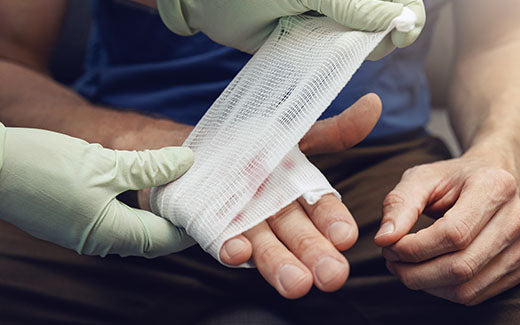
Hyaluronic Acid for wound healing
The body’s natural production of hyaluronic acid increases in response to injury and wound healing. Hyaluronic acid actually regulates several aspects of tissue repair, including the immune response and amount of inflammation. It also provides the framework for the formation of new blood vessels.
Most of the hyaluronic acid in the skin is in the dermis, where it regulates the water balance, osmotic pressure, electrolyte flow and also acts as a sort of sieve, allowing the transport of certain molecules and not others. Greater levels of hyaluronic acid increases scar-free tissue repair.
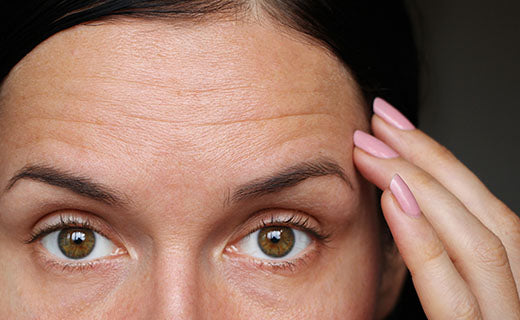
Hyaluronic Acid for wrinkles
Taking hyaluronic acid supplements helps reduce the appearance of wrinkles by improving both skin hydration and elasticity. Its ability to attract and retain water increases skin hydration from the inside out. Some double-blind, placebo-controlled studies have shown that oral hyaluronic acid supplementation can lead to noticeable improvements in skin texture, wrinkle depths and overall hydration levels.

Hyaluronic Acid for bone health
Taking hyaluronic acid supplements helps reduce the appearance of wrinkles by improving both skin hydration and elasticity. Its ability to attract and retain water increases skin hydration from the inside out. Some double-blind, placebo-controlled studies have shown that oral hyaluronic acid supplementation can lead to noticeable improvements in skin texture, wrinkle depths and overall hydration levels.
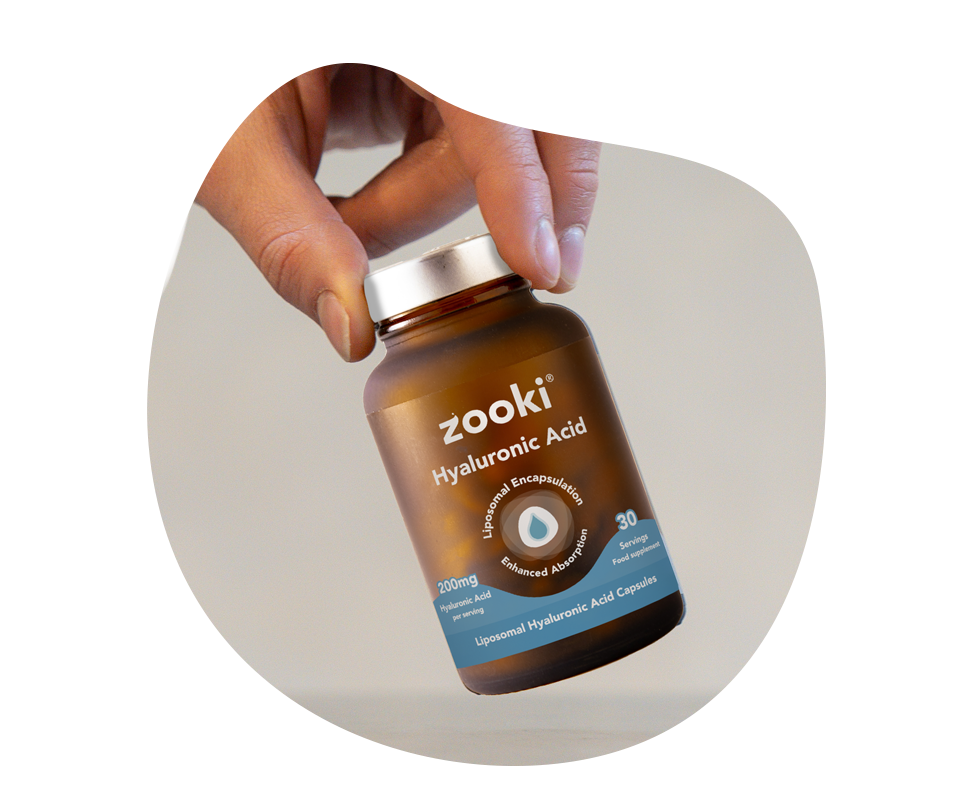
What is the best way to take Hyaluronic Acid?
Using hyaluronic acid topically allows it to draw moisture from the environment and hydrate the skin. However, taking hyaluronic acid orally has been shown to increase the concentration of endogenous (internal) hyaluronic acid from the dermis to epidermis. BUT, on its own, hyaluronic acid is hard to absorb because of its high molecular weight and poor fat solubility. Liposomal hyaluronic acid solves the problem, allowing the beneficial high molecular weight hyaluronic acid to be absorbed.

Is hyaluronic acid suitable for everyone?
As with all supplements, anyone taking medications or with pre-existing health concerns should always check with their doctor first before starting any new supplement regime. However, research has shown that hyaluronic acid is safe to use. Reactions or adverse effects are very rare and it’s also safe to use if you are pregnant or breastfeeding.
FAQs
Please read our FAQs page to find out more.
How much hyaluronic acid is in each serving?
Each capsule contains 200mg of hyaluronic acid, plus 30mg of Vitamin C, combined with our signature liposomal delivery for 4x higher absorption vs. conventional supplements.
What are the ingredients?
Hyaluronic acid Zooki is sugar free, dairy free, gluten free, soy free and contains zero artificial ingredients. To see the full list, please see the individual product pages and click the "Ingredients and info" drop down placed just below the price of the product.
What is hyaluronic acid?
Hyaluronic acid is a naturally occurring substance in the skin, known for its powerful ability to retain moisture. It helps keep skin plump, hydrated, and youthful. Found in serums, creams, and fillers, hyaluronic acid boosts elasticity, smooths fine lines, and enhances overall skin health for a radiant complexion.
How much hyaluronic acid should I take?
Take one capsule daily, any time day or night.
Can I take Zooki hyaluronic acid if I'm pregnant or breastfeeding?
We always recommend people who are pregnant or breastfeeding check with a medical professional before they take any new dietary supplement, however this supplement is generally considered safe for those pregnant or breastfeeding.
Is Zooki hyaluronic acid free from gluten, dairy, soy, alcohol, sugar?
Zooki hyaluronic acid is free from gluten, soy, dairy and alcohol.
Is hyaluronic acid Zooki vegan friendly?
Yes, hyaluronic acid Zooki is perfectly suitable for vegetarians and vegans alike.
Shop Zooki Hyaluronic Acid

Meet the author...
Sarah Carolides is one of the UK's top functional medicine and nutrition specialists with over 20 years experience, listed by Vanity Fair as one of 'The A-List people to know in London.'


